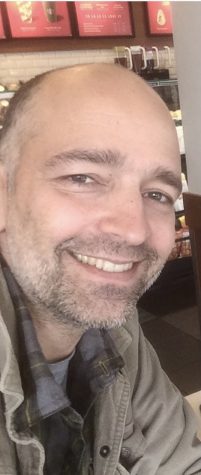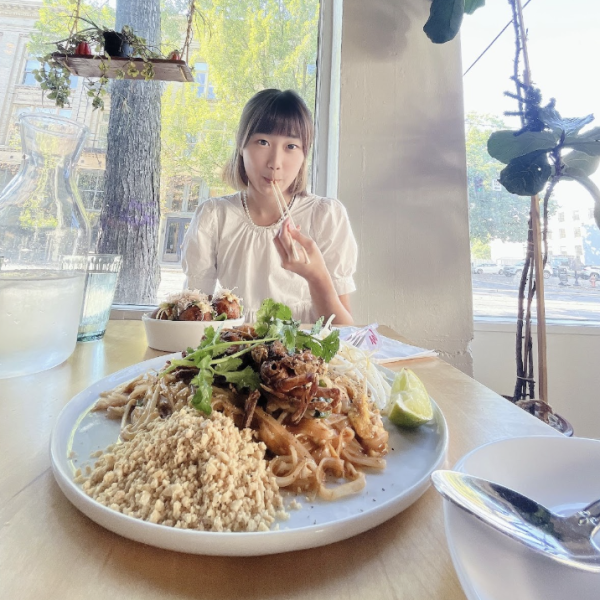Teacher Feature — Ian “Profe” Reeves
December 16, 2020
 After two years of teaching in Dayton, Oregon, Spanish teacher Ian Reeves, known to many as “Profe,” has returned to LOSD.
After two years of teaching in Dayton, Oregon, Spanish teacher Ian Reeves, known to many as “Profe,” has returned to LOSD.
After walking across South America and part of Central America and teaching Spanish one and two at LOJHS for six years, Reeves decided to change schools in 2018 for several reasons.
“There was a job opening six miles from my house, I lived closer to Amity and McMinnville, and it was six miles from my house down here. The commute to Lake Oswego Junior High was just getting at that time to something where I was like ‘ugh,’ like I’m in a car all the time, and so I took the job,” said Reeves.
“I also kind of left because I felt like I was kind of becoming a caricature of myself. Like, I was Profe, and people were walking by in the hallway and giving me high fives and stuff like that… and I didn’t even know some of the students. It was great, but I was like, ‘I’ve done nothing to earn that high five from that kid.’ And it felt weird… to be known that way by kids but not necessarily have earned any respect or earned any of the high fives that kids were giving me.” So Reeves thought that starting over at a new school would give him a chance to work hard and build those relationships again.
Aspects of high school in Dayton, however, were surprising to Reeves. “It’s a small rural town and a small rural school. And I went to a small, rural high school, so that wasn’t the shocker. The shocker for me was, while the kids were fantastic human beings, and wonderful, curious, individuals, the socioeconomic difficulties they were facing made it so that the actual act of teaching is something that isn’t secondary or tertiary, but like, way down the road…. so far down on the list of the things that you need to be focusing on, that I found that to be a real loss for me, professionally.”
Being a teacher who found reward in students’ “A-ha!” moments and feeling unequipped to handle and nurture students facing trauma, Reeves found himself in a situation where he had to adjust. “It was just putting out fires all the time. Damage control from kids…. with really acute childhood traumas. And so, that’s what I found myself doing all the time, was basically helping kids just show up to class, or helping kids just moderate their emotions within class, or helping kids wrestle with very big existential issues that they were facing.”
While he found the work powerful, he did not feel like the right person for that type of teaching. “I’m very impatient, I’m easily frustrated, I take things personally, I’m thin-skinned, and I am volatile. These are all things that don’t work well with kids who have suffered trauma… And I realized that I don’t have that mentality. I don’t have the wellsprings of patience, I don’t have that really gentle approach that makes life easier for kids in that kind of situation, and I wish I did, and I feel like those are defects of mine, but I don’t… I learned so much, I learned so much about kids who struggle with adverse childhood experiences, and I learned so much about myself.”
After fellow Spanish teacher Lisa Evonuk called to inform Reeves about a job opening at LOHS, Reeves weighed the decision to return to LOSD. “I made a list of pros and cons, and while it was pretty balanced, I was like, ‘I’m not being fed here. I am not the perfect fit for this kind of teaching and this kind of demographic… My passion and my charisma, and those things that I feel like are my strengths, would be better served at a different educational situation, maybe I should give LO another shot.’ And so I applied, and I got the job.”
Reeves has already seen a huge difference in the two demographics. “It’s… been such a delight to be in front of a group of kiddos on the screen every day, as imperfect as that is, and just have kids be like, for better or for worse… still have them be like ‘Teach me. I’m here to learn from you, teach me something.’ And I found that really refreshing, and all of the problems that kids were wrestling with in Dayton are problems that kids have in LO, it’s just more masked. It’s a little bit difficult sometimes, a little bit more difficult to dig deep in there and see some of the traumas that kids are suffering in LO. I feel like I’m much more prepared to work with kids that have suffered through trauma now that I’ve been through my experience in Dayton.”
The new experience has also caused him to reflect on his time teaching in LOSD. “In LO, I had never sought nor been given a great deal of instruction about trauma and how it informs student behavior and student learning. And… I was among those who was like, ‘Oh yeah, I mean there are kids who are struggling with traumatic experiences, but not that many….’ I didn’t even know what was going through my brain, but I was not processing that there are a significant number of kids in every walk of life who are really working with and through traumas that they’ve suffered. And so, I didn’t have the language, the vocabulary, the tools, to be able to work with those kids and also just work beforehand, be preventive and… preemptive in how I experience kids’ behavior. And so being down in Dayton and doing a lot more research on it, and doing a lot more… self reflection… I got a lot better at just… coming from a place where I’m always like, ‘Why is this kid reacting to me in this way, why is this kid reacting to the academics in this way?’”
Reeves is looking forward to many aspects of teaching Spanish one, two and three. “[A] lot of the people I consider some of my better friends are people that I began my teaching career with in Lake Oswego way back in the day. So, that’s also been a nice thing to come back to… But what I am looking forward to is, I’m looking forward to a community that is not reluctant to pursue intellectualism… I’ve already really enjoyed working with kids who have been given a vocabulary by their parents, a vocabulary to express themselves in an academic setting and to think critically… And that’s super refreshing, because I think that it’s incredibly necessary.”
He also sees his role LOSD as a better way to create change than in Dayton. “I’m also looking forward to students who… are sometimes not aware of their privilege and their entitlement and helping them become more sensitive to that and not take it for granted, and instead use it as a platform and a stepping off point to change the world. You know, the kids at our school are going to be future business leaders, future civic leaders, and they’re going to be in positions of quote-unquote power. And if they come from a place where they’re very sensitive to and desiring of changing the culture that has been with us for many hundreds of years, and looking at it in a more inclusive way, and making those changes, I think that that’s going to be super positive. And that — that’s change that I can help effect as a teacher at this school.”
The online format has also changed how he interacts with students. “I feel like I have to earn their respect. So I’m working hard to prove to them that their time spent with me is worthwhile. I think that’s how you avoid becoming a caricature of yourself, is that you always work hard as though you haven’t earned the respect of those around you, and you always work hard to maintain it.”


